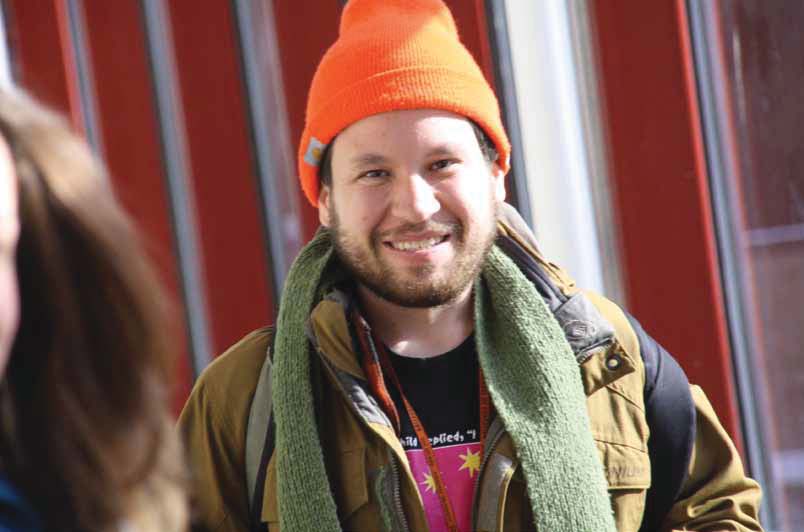Micah was featured in the Syracuse University School of Education’s Education Exchange.
Micah Fialka-Feldman opens his backpack to pull out his work binder with a smile on his face. It’s a simple, black binder with a piece of paper on the front that reads, “Micah Feldman, Teaching Assistant, SPE 311—Perspectives in Disabilities.”
The paper on top lists all of Micah’s responsibilities as a teaching assistant to Professor Wendy Harbour’s class, including grading papers, giving presentations on personal experiences, keeping attendance, teaching classes on specialty topics, and more.
“I’m looking forward to the challenge,” Micah says.
Now that Micah is working as a Syracuse University TA, he speaks to his students about his past experiences as a student with a disability. He was diagnosed with a cognitive disability when he was a child and has had to overcome educational, social, and legal challenges, especially in higher education.
Micah was admitted to Oakland University in his home state of Michigan in 2007 through the Oakland University Post-Secondary Transitions program. The three-year program allows students to audit classes, paying a fee equal to tuition, but not receive a degree. Micah attended class and socialized with regular college students, but ran into problems when he wanted a fuller college experience by living
on campus. He applied for housing and the university approved him at first, but then denied him claiming that campus housing was reserved for degree-seeking students only. Micah, however, believed the school was discriminating against him because of his disability.
“They said I wouldn’t be able to get out of the building on my own if there was a fire drill,” Micah says. “They didn’t think the other students would be friends with me.”
He sued Oakland University for housing rights, and though the process was long, he had much support from friends and classmates. Students and faculty from Oakland University gathered over a thousand signatures to support Micah’s housing request, and he ultimately won his case against the university. Micah moved into a double-sized dorm room and was happy for the independence that comes with living on campus away from home.
“I was just excited to go to college and have the college experience,” Micah says. “Most disabled students stop at high school.”
Micah now uses this personal experience, and many others, to advocate for inclusive education and social atmospheres on college campuses for all disabled students. He has been involved with this advocacy for many years, but now at the post-secondary level, Micah has been making an impact in an even greater way with speaking events and conferences. He produced his own documentary film about
his journey in inclusive education, “Through the Same Door,” and has been featured on NPR and CNN.
He became involved with Syracuse University when he learned about the Taishoff Center for Inclusive Higher Education. He was asked to speak at the Center’s 2011 DisAbled & Proud Conference about his college housing struggle. The conference, and Syracuse, left an impression on Micah. “There was every
kind of person, and every kind of disability,” Micah says. “No one was left out.”
After DisAbled & Proud, Micah continued to research the SU School of Education and learned of its long commitment to special and inclusive education. He was offered a teaching assistant position and decided to make the move to Syracuse. He’s excited about being in a classroom with a new audience of students, and enjoys participating in open dialogue with students interested in disability studies.
“I hope the students feel like they can ask any questions,” Micah says. “I hope they don’t think my disability gets in the way.”
The move from Michigan to Syracuse was a big life change, but Micah has had a lot of support from friends and colleagues. He’s a member of the Beyond Compliance Coordinating Committee, a SU
student group which focuses on creating an inclusive climate on college campuses and shaping disability as a form of diversity. He’s also on the board of the National Youth Leadership Network, which supports young adults with disabilities and promotes leadership development for them so they can become the next group of advocates for the Disability Rights Movement. Micah hopes his work will make a difference in the lives of other students like him living with disabilities, helping them realize that everyone has a right to be included.
“Inclusion in education and elsewhere is important to me because it helps people explain others with disabilities,” Micah says. “I don’t know if I would have thought about inclusion if I wasn’t being included with groups already.”
As Micah continues his educational endeavors, he also hopes to inspire disabled students to pursue a college education if they know that’s what they want out of life.
“If you want to go to college, it’s up to you to make it happen,” Micah says. “Don’t let others tell you that you can’t do it.”
